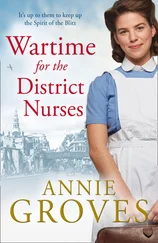‘Ted, your sisters need you,’ Mrs Jackson announced in an even sharper tone.
‘Mum’s a bit on edge and not herself with all this bombing going on,’ Ted whispered apologetically to Agnes, giving her hand a little squeeze.
Agnes nodded. She hoped so much that he was right, she thought, as she made her way slowly and with great difficulty through the mass of people filling the platform and back towards the ticket office. She hoped so much that it was only because Ted’s mother was worried for her children that she had been so off with her, and not because she didn’t like her.
Sergeant Dawson and Dulcie were four houses away from number 13 when they heard the air-raid siren. Without a word the policeman took Dulcie’s crutches from her and, wrapping one strong arm around her waist half carried and half dragged her as he ran with her in the direction of her landlady’s front door.
Dulcie wasn’t the sort to show fear – of anything or anyone – not even to herself. It was a matter of pride, something she had set out to teach herself from the very first minute she had seen her mother gazing into the basket that contained her new baby sister, Edith, with a look of such love in her eyes. So she told herself now that the hammering of her heart was caused by her exertion and not by anything else.
‘I hope that they aren’t in their Anderson already,’ Sergeant Dawson muttered half under his breath as he made to knock on the door, but Dulcie shook her head.
‘It’s all right, I’ve got a key.’
However, the door was already being opened by Olive, who exclaimed, ‘Thank heavens! I was beginning to worry that you’d be caught out in the open somewhere.’
‘Not twice in less than seven days I’m not going to be,’ Dulcie grimaced as she took her crutches from Sergeant Dawson, thanked him and hobbled inside. She had to raise her voice to make herself heard over the sound of the sirens, yelling as though in warning to the oncoming bombers: ‘You aren’t getting a second chance to get me.’
‘Come on. I’ll help you both down to the Anderson,’ Sergeant Dawson told them, also raising his voice, as the noise of the planes’ engines vied for dominance with that of the siren.
‘You should be getting yourself to safety,’ Olive, who had her arm around Dulcie and was guiding her down the hall, protested as he stepped inside and closed the door behind him.
‘I’m on ARP duty. I’ll have to check the street and make sure that everyone’s left their houses, so I may as well start here.’
‘Where’s Tilly?’ Dulcie demanded when they reached the empty kitchen; the anxiety sharpening her voice touched Olive’s heart and reminded her of just how much her opinion of this young woman had changed in a year.
‘I sent her to the Anderson the minute we heard the siren,’ Olive told her.
Meaning that Olive had waited for her, Dulcie recognised. The tears she hadn’t allowed herself to cry with her mother now filled her eyes and made her blink determinedly to hide her emotion. Dulcie didn’t believe in having emotions, never mind giving in to them. Or at least she hadn’t done until the other girls living at number 13 had risked their lives to save hers when they had been caught in the open in the city’s first big bombing raid.
That night had bonded them together for ever and had completely changed how Dulcie felt about them and about living at number 13. But most especially it had changed how Dulcie felt about Olive.
Olive was glad of the carefully shielded beam of Sergeant Dawson’s torch after they had left the blacked-out house behind and were making their way down the unlit garden path to the Anderson, where, against all the rules, Tilly had the door open, the lit oil lamp glowing out from inside.
There was just time for her to thank Sergeant Dawson yet again before the sound of their voices was drowned out by the incoming bombers, so close now, surely, that Olive didn’t dare risk glancing up at the sky as she shooed Dulcie into the shelter ahead of her and then pulled the door closed behind herself.
‘Mum said that you’d make it back,’ Tilly greeted their lodger. ‘She’s made you some sandwiches in case you didn’t get round to having your tea, and there’s a flask here as well.’ She held up the flask to show Dulcie, who nodded her head.
It was not in Dulcie’s nature to thank others effusively for anything, but there was something in the smile she gave Olive that sent its own special message of all that she now felt for her landlady and her kindness.
‘How was your mother, Dulcie?’ Olive asked as they all settled themselves on the three bottom bunk beds that formed a U shape at the far end of the shelter. ‘Has there been any news about your sister?’
‘No. Mum’s convinced that Edith’s dead, though, and I suppose she must be. She and Dad have been round all the hospitals and the rest centres, and Mum reckons that as Edith would have let her know if she’s all right, she must be dead. She says she doesn’t want to stay in London any longer. Her and Dad are off to Kent in the morning. Dad’s got the promise of a job and somewhere to stay from Paul Dunham. He’s the builder Dad already works for, and he’s got contacts in Kent. We all used to go to Kent hop picking when I was a kid. Hard work it was as well.’
There was a wealth of bitterness in Dulcie’s voice when she talked about her mother that gave away her real feelings, but Olive felt it tactful not to say anything.
The increasing noise of the incoming bombers was now making conversation all but impossible. Tilly covered her ears, and they all looked upwards at the dark roof of the shelter.
‘It will be the docks they’ll be after again, not us,’ Dulcie mouthed.
‘At least we’ve got the ack-ack guns defending us now,’ Tilly mouthed back against the fierce pounding noise from the British gun batteries.
Of course, it was impossible for them to see what was happening as they daren’t risk breaking the blackout by opening the door, but they could hear a second wave of bombers directly overhead, whilst the shrill whistle of bombs falling from the first wave could be heard mingled with the dull heavy ‘whoomf’ sound of the explosions.
‘They were saying at work this morning that the docks were burning so fiercely the other night, the wood was reigniting even though the firemen had soaked it and put the fire out once,’ Tilly said. ‘I never thought before of fire being so dangerous. A fire used to be something I’d look forward to coming home to on a cold winter’s day, something that warmed you, not killed you, but now . . .’
‘At least the RAF are giving the Germans a taste of their own medicine,’ Dulcie replied, trying to lift Tilly’s spirits by reminding her of what they’d heard on the wireless of a night time raid Bomber Command had made on German cities earlier in the week in retaliation for the Luftwaffe’s attack on London.
‘Time we had those sandwiches, I think,’ Olive decided when a fresh crescendo of explosions had both girls looking noticeably pale-faced in the glow of the oil lamp. Olive couldn’t forget the danger they had already faced and from which, miraculously, they had escaped safely. They had made light of the experience since, but Olive wouldn’t have blamed them if they had shown far more fear now than they were doing.
‘Some East Enders we’ve had at the hospital have been saying that Hitler is only bombing the East End because he wants to get rid of it before he sets himself up in London,’ Tilly told her mother. ‘He doesn’t care how many people he kills and hurts.’
‘It’s the docks the Germans have been aiming for,’ Olive pointed out, ‘because they know how important they are for bringing in supplies to keep the country running.’
Читать дальше












